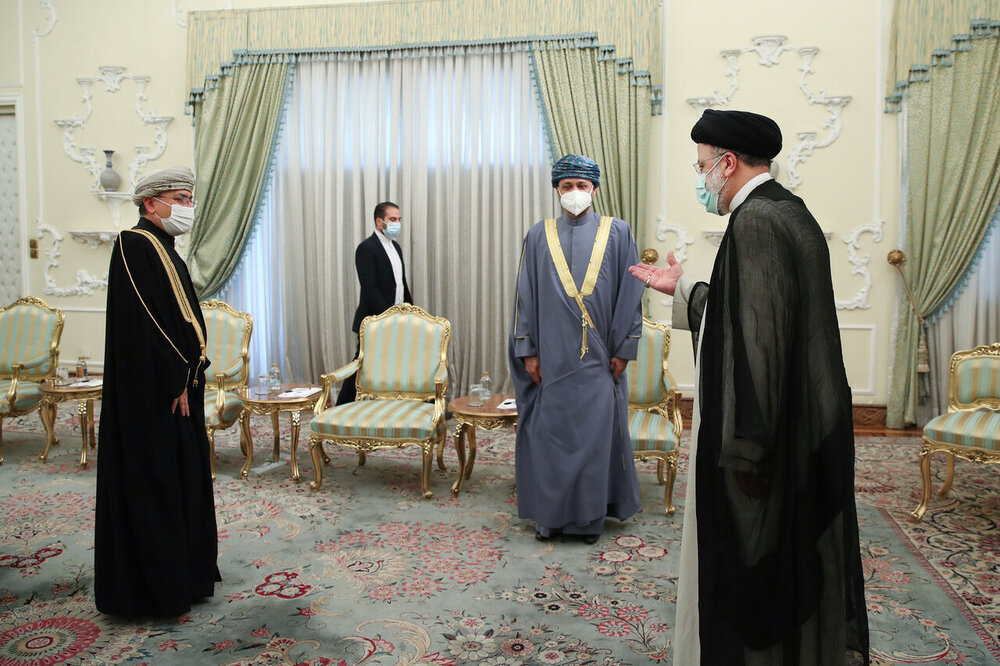Iran president to visit Oman

TEHRAN – It’s now official. Iranian President Ayatollah Seyed Ebrahim Raisi will pay an official visit to Oman on Monday as part of his administration’s push to boost ties with neighboring countries.
State news agency IRNA reported that Raisi's visit to Muscat will be for one day, during which he will hold talks with the Omani Sultan at Al Alam Palace, and sign several cooperation documents in various fields.
The visit was widely hailed by Iranian officials as strategic and important. Hossein Noushabadi, a member of the Iranian parliament’s National Security Council and Foreign Policy Committee, told IRNA that the visit is “strategic.”
The trip to Oman is part of a new trend in Iranian foreign policy initiated after Ayatollah Raisi took office in August 2021, which attaches special importance to the expansion of ties with the neighboring countries.
At the start of his presidency, Ayatollah Raisi announced that he would prioritize what came to be known as “neighborhood policy,” one that rests on fostering good neighborly relations with all neighbors and boosting ties with Eastern powers along with Europe.
Commenting on the news of Raisi’s imminent visit to Oman, Iranian ambassador to Oman Ali Najafi wrote on Twitter that the visit confirms the priority of neighbors in Iranian foreign policy.
He added that in this regard relations with Oman are given a priority. He also stressed that expanding trade relations with Oman tops the agenda of Raisi’s visit.
“Oman is a priority in Iranian neighborhood policy. Development of economic ties with Oman is a priority,” he tweeted.
In an interview with state news agency IRNA, Najafi praised the foreign policy of the Raisi administration. “I believe that the government's approach to developing cooperation with its neighbors is the right and precise strategy. Iran is located at a very important geographical point. It has many neighbors and the priority of cooperation with neighbors can create good capacities to strengthen the relations of the Islamic Republic with neighboring countries in various fields of economy, trade, culture, tourism, transit and transportation cooperation,” he said.
Aside from economic issues, which are expected to take center stage, Ayatollah Raisi’s visit to Muscat is also of diplomatic and political importance.
Raisi is visiting at a time when the growing trend of normalization between Israel and some Arab states has raised concerns in Tehran. This may be the reason why Noushabadi described the visit as strategic. He said that the visit can play a very important role in the development of relations and expansion of Iranian relations in the southern part of the Persian Gulf and the Sea of Oman.
He added, “Iran's consultations and coordination on regional issues with Oman have always been desirable, and this trip can also be important in further developing relations, and the President's visit to Oman in this situation is very decisive, sensitive and effective.”
Referring to the normalization of relations between Israel and some Arab governments, the lawmaker said, “We strongly criticize the normalization of relations between some Arab countries and the illegitimate and usurping Zionist regime. And through good relations and mutual respect with neighboring countries, we try to make them in no need of relations with extra-regional countries. This fake regime has nothing in common with the culture, history and civilization of the region. Strengthening these ties [between Iran and the Arab states] will diminish the Zionist regime's presence in the region. We must convince the neighboring countries to prioritize their relations with the Islamic countries in order to establish peace and stability in the region.”
The lawmaker pointed out that the United States and some European countries are in the region, seeking illegitimate expansion with their sinister and seditious intentions.
He noted the leaders of “some Arab states should know that they should trust the neighboring Islamic countries” and that they do not need “the extra-regional countries that cause instability and insecurity.”
Oman seems to have a role in this regard, at least from the Iranian perspective. The Iranian ambassador to Oman highlighted Muscat’s role in the Tehran-Riyadh talks.
“The role of Oman has always been considered effective and important, but currently the negotiations between Iran and Saudi Arabia are being pursued within the framework of Baghdad,” he said.
He added that Oman has tried at various times to help solve various problems and issues. “The Islamic Republic of Iran welcomes such a constructive role in line with its principled policy to help consolidate peace and security at the international level,” the ambassador said.
The ambassador also said that the countries of the region should resolve issues through dialogue among themselves. “We believe that these communications can lead to clearing up misunderstandings, help define and design grounds for friendly cooperation in the relations of the Islamic Republic of Iran with different countries,” he remarked.
